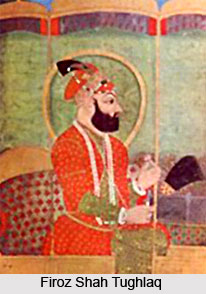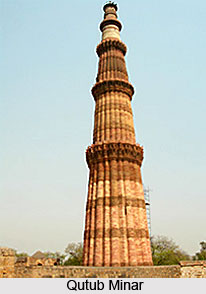 Firoz Shah Tughlaq paid great attention towards the domestic affairs of his state. During the last years of the reign of Muhammad Bin Tughlaq, the administration had disrupted and the subjects were dissatisfied, and also there was a breakdown of the economy. The Muslims were also dissatisfied with the policy of the Sultan. Firoz Shah concentrated his efforts to improve these matters. He adopted a number of measures in the field of finance, education, irrigation, army and administration and succeeded in all of them.
Firoz Shah Tughlaq paid great attention towards the domestic affairs of his state. During the last years of the reign of Muhammad Bin Tughlaq, the administration had disrupted and the subjects were dissatisfied, and also there was a breakdown of the economy. The Muslims were also dissatisfied with the policy of the Sultan. Firoz Shah concentrated his efforts to improve these matters. He adopted a number of measures in the field of finance, education, irrigation, army and administration and succeeded in all of them.
Firoz Shah Tughlaq strived to reinstate confidence among his subjects, restore financial prosperity of his subjects and the state and win over the confidence of the Muslim subjects. He largely succeeded in achieving these objectives. Though Firoz Shah himself was not a very good administrator but he was endowed with good judgmental skill and possessed wisdom to select subordinates and assign them powers. He ruled for thirty seven years and was successful in increasing the prosperity of his subjects.
Financial Policies of Firoz Shah Tughlaq
Firoz Shah`s financial policies were aimed at the growth and prosperity of his state. He imposed only four types of tax on his subjects and abolished nearly twenty four taxes which were, undoubtedly, intense on the people. He abolished several internal trade taxes which resulted in lessening of prices of goods and improvement of trade. He also adopted measures for the development of quality of cultivation and better crops. Firoz increased salaries of his officers, gave them jagirs, abolished the practice of extorting truth by torture and also the practice of offering presents to the Sultan so that they might not pressurise the peasants. The peasants were freed from return of Taqavi given to them by the state. The measures of Firoz Shah were successful and resulted in the rising prosperity of both the subjects and the state. There was all round prosperity among people; and, there was no famine during the reign of Firoz Shah Tughlaq.
 Administrative Policies of Firoz Shah Tughlaq
Administrative Policies of Firoz Shah Tughlaq
Firoz Shah`s administrative policies of justice were based on the laws of Islam. This restored the privileges of the qazis. He was in favour of mild punishment and had his own court for administering justice. Firoz Shah had keen interest for the development of education in his state. He was a scholar himself and patronised several writers in his court. He established a fine library in the temple of Jwalamukhi which consisted of three hundred volumes of Sanskrit texts. A few of those texts were translated into Persian. The army organisation of Firoz Shah was comparatively weak. There was no standing army kept at the center and the Sultan had to depend on the forces of the provincial governors at the time of war.
Public Utility Works of Firoz Shah Tughlaq
Firoz Shah is attributed of founding three hundred towns which included those villages which were left desolated by the people but were again repopulated because of the facilities provided by the state during his reign. The important among them were Fatehbad, Hissar, Firozpur, Jaunpur and Firozabad. He generally lived in Firozabad, near Red fort of Delhi, which was his favourite city. He is also credited for the construction of many dams, colleges, palaces, caravan sarais, towns, hospitals, mausoleums, public baths, wells, bridges and several pleasure houses. He established a charitable hospital called Dar- ul- shafa near Delhi. Firoz Shah repaired many historical buildings such as the Jama Masjid of old Delhi, the mausoleums of Sultan Iltutmish and the Qutub Minar. Firoz Shah distributed a large quantity of wealth and land among saints and other religious people. An employment bureau was set up by Firoz shah, which arranged for the employment of the unemployed. He had set up a separate department which cared for the orphans and widows. Thus, Firoz Shah had done many works of public utility.
Firoz Shah constructed five canals for the purpose of irrigation. The first one was one hundred and fifty miles long and carried the waters of the Yamuna River to Hissar. The second was ninety six miles long and carried water from Sutlej River to the Ghaghara. The third started from the Sirmaur hills and ran up to Hansi. The fourth ran from Ghaghara to Firozabad and the fifth ran from the Yamuna River to Firozabad. He also built several tanks and dams to store water for irrigation. These irrigation facilities resulted in the extension of area under cultivation, enhancement of trade and also income of the state.
Thus, though there were several flaws in the domestic policies adopted by Firoz Shah Tughlaq, but eventually he succeeded in achieving his aim of attaining peace and economic prosperity in his state and among his subjects.






































